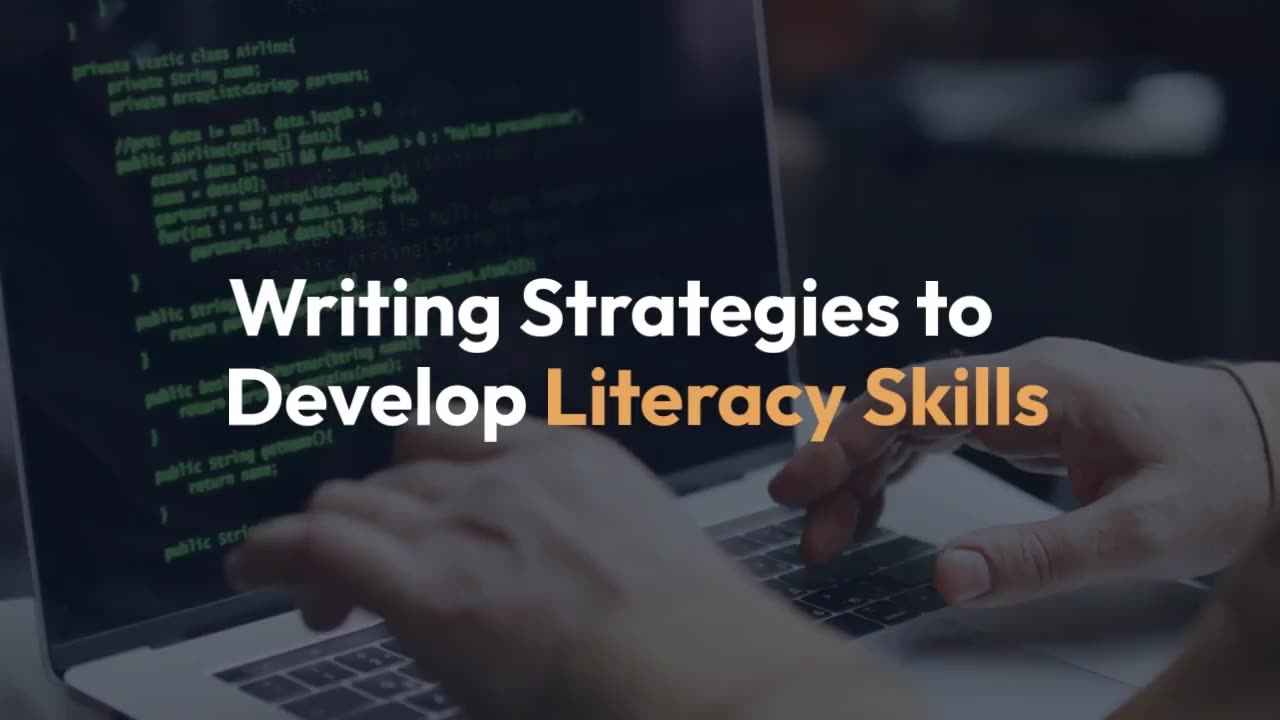Premium Only Content

The Impact of Developing Literacy Skills to gain Career Advancement
Literacy skills are an essential part of a successful career, regardless of the type or field. They comprise of reading, writing and communication-related capabilities that help individuals to understand information from various sources, express their thoughts effectively and comprehend various topics related to their professional lives. Developing these skills is important for many reasons; it can improve communication within the workplace and with clients, foster creativity when problem-solving and open up opportunities for career advancement. Additionally, having strong literacy skills allows individuals to stay informed about industry trends in order to remain competitive in their respective fields. It also enables them to better understand written instructions which helps increase productivity at work. Finally, by developing effective listening techniques, they can be more attuned to customer needs which will benefit any business or organization they may be affiliated with.
The Impact of Developing Literacy Skills to gain Career Advancement
Benefits of Literacy Skills
Having strong literacy skills can also lead to improved critical thinking abilities. By reading various texts, individuals are able to gain a better understanding of different topics and learn how to think more critically about them. This allows for the development of analytical skills that can be used in any profession and help people make informed decisions faster than those who lack this skill set. Furthermore, being able to interpret written material accurately enables comprehension of complex concepts which is key when developing creative solutions for unique problems.
The enhancement of learning abilities is another benefit associated with good literacy practices. Being literate unlocks access to information from source materials such as books, magazines or websites that would otherwise be inaccessible due to poor language skills or an inability to comprehend text-based content. As a result, students and professionals alike have the opportunity to increase their knowledge base by exploring new ideas while deepening their understanding of existing ones—all thanks to having adequate literary proficiency levels.
Finally, improving communication within the workplace is one of the greatest advantages garnered from possessing strong literacy skills; not only does it allow for clear and concise exchanges between colleagues but it also makes an individual’s work more efficient as they are better equipped at conveying messages accurately via both verbal and written means. With these tools in hand, employees will have greater confidence when interacting with clients or customers which could ultimately result in increased sales or higher customer satisfaction ratings depending on the industry they are working in.
Reading Strategies to Improve Literacy Skills
Reading out loud is an effective tool for improving literacy skills. This technique allows individuals to gain a better understanding of the text by hearing it aloud, which can help them identify words that they may have otherwise missed due to skimming or misreading. Additionally, reading out loud helps increase fluency and pronunciation accuracy which is especially useful when learning a new language or dialect. Furthermore, this technique increases focus as it requires readers to actively engage with the material instead of simply glancing through pages while still being able to comprehend what’s being said or written without having to reread sections multiple times.
Using reading techniques such as summarizing passages or highlighting key points can also be beneficial in enhancing literary proficiency levels. Summarizing involves breaking down complex concepts into simpler terms and identifying any main ideas presented in the passage; meanwhile, highlighting helps readers recall important information more easily by drawing attention directly to those particular areas within the text. Both strategies are helpful in improving comprehension and retaining knowledge from source materials which could prove invaluable during exams or presentations where quick thinking is required.
Exploring different types of texts such as poems, short stories and plays can also improve literacy skills significantly because these genres require readers to interpret symbols, metaphors and allegories—all elements found within many works of literature throughout history but not always present in other forms of writing like news articles or instruction manuals. By doing so, individuals will develop their analytical abilities as well as recognize how various styles affect meaning; both traits will come in handy when deciphering larger pieces with greater complexity later on down the road.
Writing Strategies to Develop Literacy Skills
Grammar and punctuation are essential skills for any writer looking to develop their literacy. Understanding the rules of grammar is key in helping individuals create clear, concise sentences that readers can comprehend easily; meanwhile, proper use of punctuation ensures that phrases and ideas flow together seamlessly. To become a better writer, it’s important to familiarize oneself with the conventions associated with language—this includes studying topics such as sentence structure, verb conjugation and parts of speech. Knowing these basics will help form a strong foundation from which more complex writing styles like dialogue or narration can be built upon later on down the line.
Applying research techniques is another great way for writers to improve their literacy skills. Research involves gathering information from reliable sources such as books, articles or interviews then assessing it for accuracy before incorporating it into your work. Doing this allows authors to write with confidence knowing they have adequate evidence supporting their claims while providing readers with an authoritative voice they can trust when reading material related to specific topics. Additionally, research also teaches writers how to organize large amounts of data properly so readers don’t get overwhelmed by too much information at once; this knowledge helps them craft compelling arguments that hold up even under scrutiny from experts in the field.
Improving writing structure and style is often necessary for more creative pieces such as stories or essays where creativity plays a major role in conveying meaning effectively without sacrificing clarity and conciseness. Writing structures like paragraphs provide context clues about what follows while distinct styles add flavor through word choice or format; these elements combined give any piece its own unique identity separate from other works on similar topics making them stand out even more in terms of quality content production (QCP). Furthermore, having good structural foundations allows authors to experiment freely within certain parameters creating room for additional exploration within set boundaries resulting in interesting takes on conventional subjects that bring something new to the table every time they are read over again.
Developing one's personal
How to Utilize Literacy Skills in a Professional Setting
Developing strong literacy skills is beneficial in many professional settings. To maximize the effect of these skills, it’s important to understand best practices for professional writing such as proper formatting and grammar usage that will make documents more presentable. Keeping up with industry trends is also essential; this can be done by reading industry-specific publications or attending seminars related to one’s field. Additionally, mastering presentation techniques such as public speaking or using visual aids can help individuals better communicate their ideas while making them look more competent and reliable when representing their company or organization. Furthermore, knowing effective listening techniques can enable workers to stay attuned to customers needs which not only benefits businesses but also helps build relationships with clients resulting in greater loyalty over time.
Finally, having a good handle on language proficiency levels allows for improved critical thinking abilities due to the increased exposure from source materials gained through adequate literary prowess levels. Being able to interpret written material accurately enables comprehension of complex concepts which gives people an advantage when developing creative solutions for unique problems. Furthermore, being literate unlocks access to information that would otherwise be inaccessible due to poor language skills allowing students and professionals alike the opportunity increase their knowledge base through exploring new ideas while deepening understanding of existing ones—all thanks enhanced learning capabilities granted by maintaining high literacy standards.
Conclusion
In conclusion, developing strong literacy skills is essential for professional success as it enables individuals to effectively communicate with customers or colleagues and process complex ideas while offering a unique edge when presenting topics in creative ways. Being literate provides advantages on multiple fronts from improving confidence in customer interactions which could lead to increased sales or ratings, to having a better understanding of source materials allowing readers the opportunity to uncover new insights that had previously been inaccessible. Finally, mastering language proficiency levels also helps strengthen critical thinking abilities giving people an advantage when coming up with innovative solutions for challenging problems—all thanks to heightened learning capabilities granted by maintaining high literary prowess levels.
-
 1:13:18
1:13:18
Wendy Bell Radio
7 hours agoPet Talk With The Pet Doc
42.4K61 -
 LIVE
LIVE
dieseldesigns
5 hours agoExploring Labs In the DARK! // Abiotic factor
16 watching -
 LIVE
LIVE
BBQPenguin_
4 hours agoDragonball Z - The Android Saga
116 watching -
 LIVE
LIVE
Total Horse Channel
5 hours ago2025 URCHA Futurity | Derby & Horse Show | Saturday
32 watching -
 LIVE
LIVE
DynastyXL
5 hours ago🔴LIVE: Fortnite The Comeback Stream Starts Here🎃
54 watching -
 1:38:57
1:38:57
njgaming23
3 hours agoCoffee and Morning vibes #rumbletakeover
9.52K -
 1:09:19
1:09:19
Ami's House
2 days ago $18.19 earnedWhen Defending Israel Backfires: Are We Pushing Our Last Friends Away? With Karys Rhea
181K188 -
 8:13
8:13
WhaddoYouMeme
21 hours ago $1.57 earnedThis Gets More Tragic By The Second
13.3K10 -
 40:47
40:47
SouthernbelleReacts
2 days ago $1.94 earnedThe Faculty (1998) | Back-to-School Horror Movie Reaction | Alien Invasion in High School!
20.3K5 -
 6:58
6:58
Adam Does Movies
20 hours ago $0.60 earnedCaught Stealing - Movie Review
13.2K3